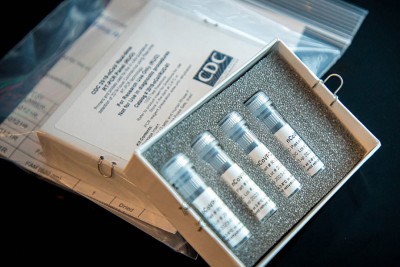COVID-19 Mass Testing in Austria: All Details
The 50 million Euro project of Austria's +240,000 mass tests will start after the lockdown on December 5. The mass tests will be started with the teachers, followed by the police officers and then the population, the government announced.
 Tests from the companies Roche (4 million) and Siemens (3 million tests) will be used. / Picture: © Wikimedia Commons / U.S. Centers for Disease Control, Public domain, via Wikimedia Commons
Tests from the companies Roche (4 million) and Siemens (3 million tests) will be used. / Picture: © Wikimedia Commons / U.S. Centers for Disease Control, Public domain, via Wikimedia Commons
The plans for the planned COVID-19 mass tests in Austria have been finalized
On Saturday and Sunday, December 5th and 6th, and thus at the end of the hard lockdown, all teachers as well as kindergarten teachers are to be tested. That is about 200,000 people.
On December 7 and 8, the testing of all 40,000 police officers will follow.
Shortly before Christmas, a broad-based series of tests is planned for the entire population.
The participation is voluntary
In preparation for the mass tests before Christmas, free tests will also be carried out on the population in the first week of December in selected communities with high incidence values.
Seven million rapid antigen tests have already been ordered and further orders are planned.
The cost of the first seven million tests is 50 million Euro.
Tests from the companies Roche (4 million) and Siemens (3 million tests) will be used.
At the beginning of the new year, a second mass test series is planned throughout the country, the government announced today.
What are the overall types of COVID-19 test methods
Covid-19 can be detected directly by virus detection or indirectly via antibodies (which are formed during an infection). According to international guidelines, the direct detection of the pathogen by means of quality-assured PCR is still the gold standard for the early diagnosis of an infection.
PCR tests (polymerase chain reaction) are used to detect a current COVID-19 infection. For PCR tests, samples are taken from the throat or nasal cavity.
Antigen tests: In addition to PCR tests, antigen tests offer another possibility for direct pathogen detection of SARS-CoV-2. Antigen tests do not require a laboratory for evaluation, the result is available within a short time (about 20 minutes), they are currently available and inexpensive, but are less reliable compared to PCR tests. In contrast to PCR tests, antigen tests do not detect the genetic material of the virus, but its protein or protein envelope.
Antibody tests check the presence of antibodies against a virus in the blood. Since antibodies are only formed in the further course of the infection, the detection of antibodies can be expected on average about 12-14 days after an infection, so that these tests are not suitable for early diagnosis.



